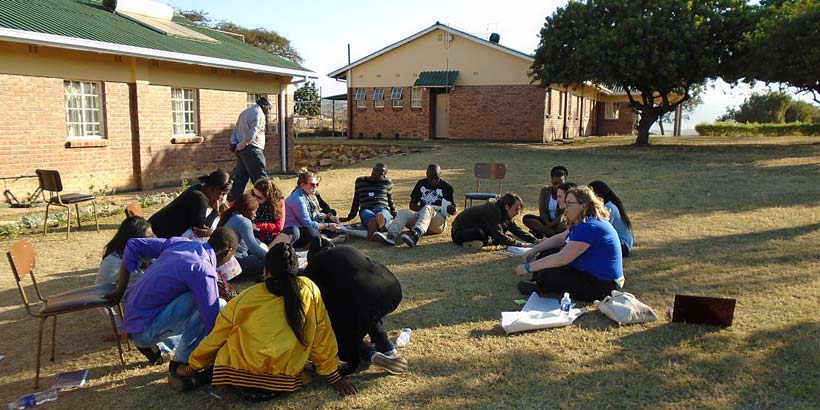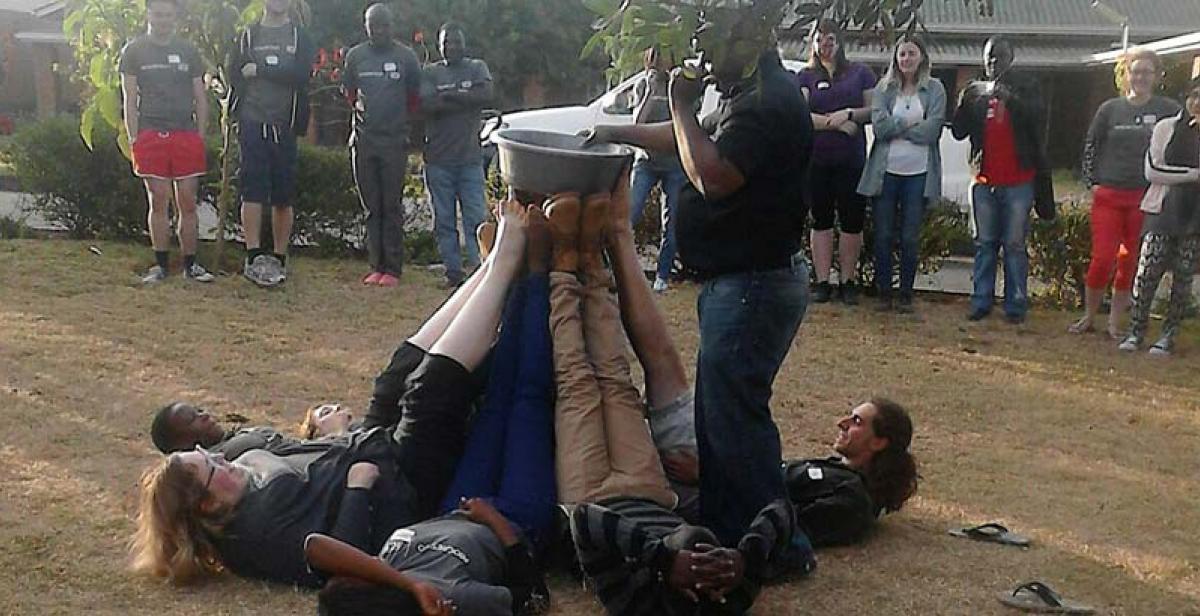Mary:
Yowaziggy!
You might be wondering why this strange yet wonderful word “Yowaziggy” has become the greeting for our first blog entry. Well then, I shall enlighten you. The phenomenon that is “Yowaziggy” started in our first week of orientation, at the Catholic Pastoral Training Centre, in Mutare. Surrounded by beautiful scenic mountains, you really couldn’t have asked for a better place to be welcomed. It was a Wednesday, and I had volunteered to be in charge of the ice breakers for the day. The first thing that came to my mind as I stood in front of sixty national and UK volunteers, their eyes full of hope and anticipation, was “YOWAZIGGY.” Soon enough there was a room full of very professional, and extremely ridiculous looking volunteers shouting “Yowaziggy” at the top of their lungs, whilst swaying from side to side. Little did I know, it would become a popular trend amongst the national volunteers to holler “YOWAZIGGY” anytime they see me. This will definitely not be short lived.
If we rewind two days earlier, sitting on the combi from Harare to Mutare, when none of the UK volunteers had had the pleasure of meeting the nationals yet. We all had our expectations of how the first meeting would be, mine being that communication would consist of dodgy miming and the national volunteers wouldn’t have the best English. In reality, I was very wrong. I jumped off the four hour combi journey, slightly disorientated, to be greeted by a lovely national volunteer named Keith. I was shocked, his English and pronunciation was better than mine, which isn’t hard to beat with my inaudible Belfast accent. There were hugs, handshakes, laughs and smiles everywhere; they had welcomed us like long lost family members, and two weeks down the line, that is exactly what we have become. I was proud that there weren’t many “Sorry, what was that’s?” whilst speaking to the nationals, maybe I had finally accomplished in slowing down my speech. However, this was not the case. Now that we are a cosy family, the nationals had no bother clarifying that they could barely understand a word I was saying on the first night! Oh the shame.
Blessing:
Tuesday afternoon (07/07/2015) all the national volunteers (ICVs) had assembled at St Joseph’s Catholic Pastoral Training Centre in Chikanga Phase 3, a suburb in the City of Mutare for the orientation with the volunteers from the UK (UKVs).
The volunteers from the UK were on their way from Harare to Mutare for this orientation and were expected to arrive in the evening. I was wondering how we were going to bond, that nerve wrecking feeling and anticipation of how it will be to meet someone from a different background for the first time. Truly, that moment we (ICVs) were waiting for had finally arrived.

Come evening the volunteers arrived and everyone at the campus was just happy. The ICVs were so eager to talk and interact with the UKVs and fortunately the UKVs were very welcoming. So the uncertainty I earlier on had on whether the UKVs will be willing to interact with the ICVs had been proven wrong. Everything was flowing smoothly like water from Odzani and Mutarazi falls.
Surely it was an amazing experience and I couldn’t imagine chatting for more than an hour with someone I was meeting for the first time and again from different, if not extreme backgrounds. Cultural exchange just began.
The UKVs were introduced to our staple food (sadza) at dinner and a leaf vegetable called kale or ‘covo’ (as it is commonly known by the locals). Everyone seemed to like the meal although a few of the UKVs found it difficult to take a lot. It was their first time to have such kind of a meal, except for John who had once tasted sadza during his previous placement in Zimbabwe. Moreover, the sitting arrangement between the national volunteers and the UKVs was so amazing. It was so striking how people had bonded in such a short period of time they had just met. Once again truly speaking, by the end of the day I had interacted with most of the volunteers from the UK and had grasped their names.
It was indeed a nerve wrecking build up to my first meeting with the UKVs. And alas, to my surprise it turned out to be my best multicultural experience.
Thalaya:
When you find out you’re going to be spending 10 weeks in Zimbabwe doing volunteering work, there’s a few things you can’t help wondering about… The, who’s? What’s? And, when’s?
Pre-Zimbabwe, I had a mental list of questions that just seemed to grow as the day of the flight crept closer. What if I can’t speak Shona? What if my host-family don’t like me? Who am I going to be in a team with out there? How often will I have Wi-Fi? When will I tweet? Will I ever get used to cold, bucket showers?! So many questions, so little time.
On arrival in Harare, on 6 July, we were greeted by both our UK team leaders, and the in-country team leaders. This was a sweet moment for myself and other UK volunteers (UKVs), as after having spent an entire day on and off aeroplanes and in and out of airports and busses, it was nice to see some familiar faces and some not-so-familiar-but-just-as-welcoming faces too.
We spent our first day and night in Harare, resting up, winding down, and tasting sadza for the first time! (You’ll read more sadza related blogposts as the weeks go on, I’m sure) The next morning, we all had a big breakfast and got ready to leave for Mutare later that afternoon. We drove down, in somewhat of a south-east direction (my geographical knowledge of Zimbabwe is rather limited as of yet; I’m working on it) for roughly five hours. We did stop at a service station that looked like something out of a film set, surrounded by palm-trees, sand, and kittens and we munched on cheese-toasties and chips so there are definitely no complaints. We arrived in Mutare at St. Joseph’s accommodation, late, slightly disorientated, but eager to meet the national volunteers (ICVs).
The next few days consisted of orientation. This was essentially, about 60+ volunteers, seven team leaders, a whole panel of Progressio staff and partner organisation representatives discussing ideas of cultural exchange, the importance of planning and working towards goals, how to monitor and evaluate said goals, and lots of interesting and questionable ways of breaking the ice… nonetheless, ice was broken and fun was had.
Once orientation was over, on 11 July, UKVs met their host-families for the first time and got to know a little more about who they will be staying with for the coming weeks. As expected, there were several moderately nervous 18-25 year olds beforehand - myself included - so this initial meeting of new families, new pets and new homes was incredibly important and reassuring.
This allowed us to have the weekend with our host-families, as well as a little time to un-pack, settle in and come in to work on Monday raring to go! And that is exactly what we did!
My team and I are working on a new project and cycle with the organisation, Caritas and when I say we’ve been working in fields, I mean, we’ve been working in the fields! There’ll be more on that in later blogposts though.
For now, all the love.
Patricia:
The best way to describe our journey so far is, “utter amazement”. The journey started with pre-placement training at the Catholic Pastoral Training Centre in Mutare for the in-country volunteers (ICVs). Among other things, the ICVs were taught about what ICS Progressio is, how it works and what is expected from them.
The arrival of the UKVs lightened the atmosphere, as the group came along with a lot of energy. We spent three days having an orientation at the Catholic Centre, forming friendships and learning more about Progressio as a full team. Luckily the barriers between us were broken down in less than a day with our first orientation, where the conversations flowed naturally like a waterfall leading swiftly to, “ONE LOVE!”
Come Monday, everyone was full of energy and ready to roll - starting with the introductory meetings with Caritas. We are the generation that can really make a change to HIV prevalence rates by raising awareness, protecting ourselves and educating others, as well as forming sustainable projects which can alleviate poverty. We hope that as pioneers of the first ICS and Caritas cycle, we will make a difference in having one common goal as a team, in improving the livelihoods of Kentucky in the next eight weeks…
Rugare! (That’s, “peace” in Shona)
Written by ICS volunteers Mary, Blessing, Thalaya and Patricia



